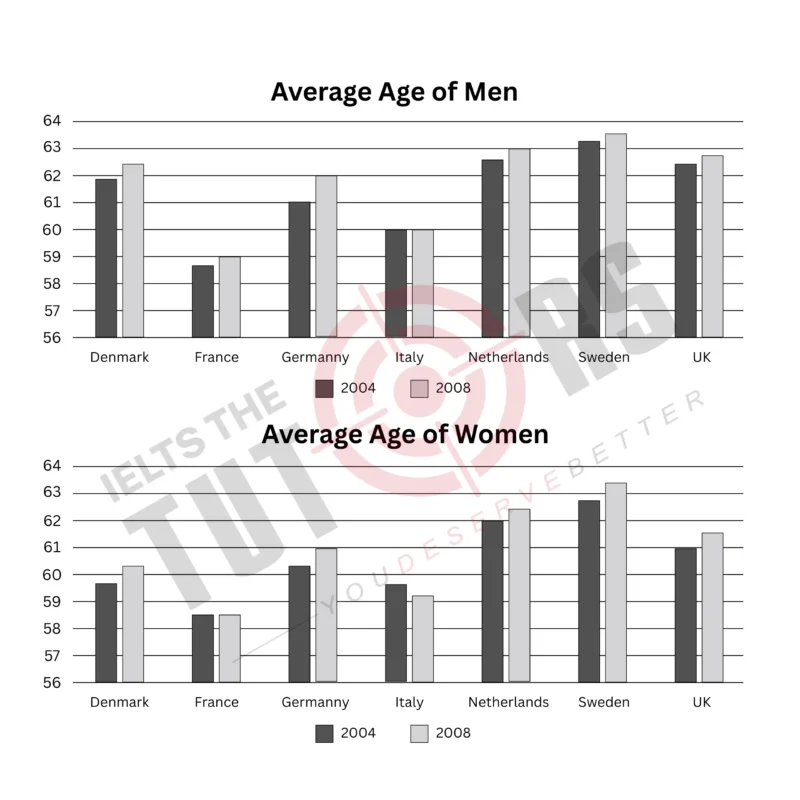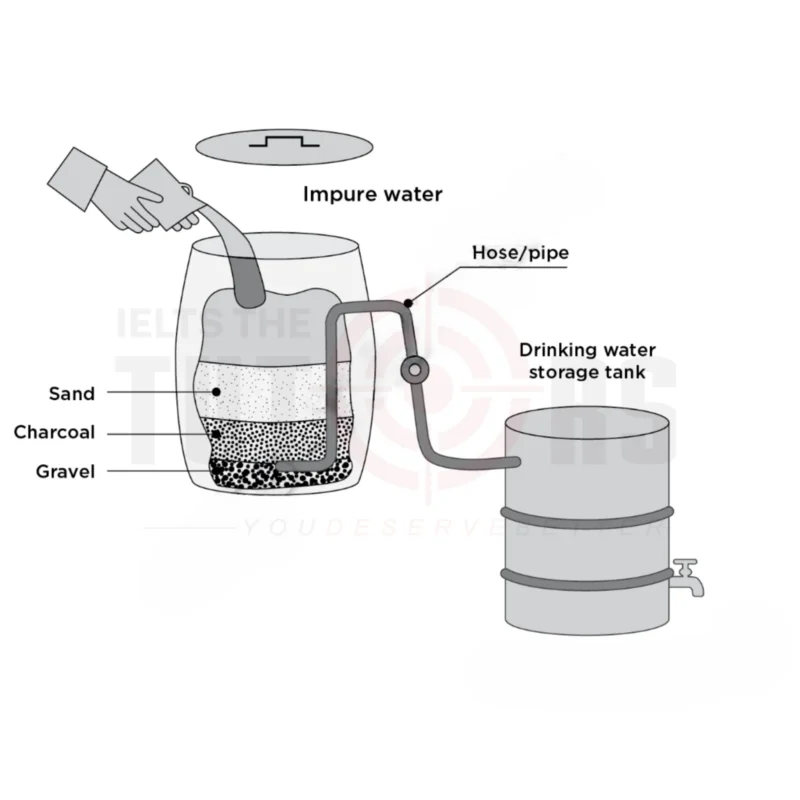
Tổng hợp bài mẫu IELTS Writing Task 1 & Task 2 tháng 04/2025 cập nhật mới nhất vào mỗi tuần. Đề được giải từ đội ngũ giáo viên band 8.0 giúp người học nắm bắt xu hướng đề thi.
IELTS Writing sample ngày 05/04/2025
Task 1
The charts below show the average age men and women retired in seven countries in 2004 and 2008. Summarize the information by selecting and reporting the main features, and make comparisons where relevant.

Sample:
The two bar charts illustrate the average retirement age of men and women in seven countries in 2004 and 2008.
Overall, it is clear that in both years, the retirement age for men was generally higher than for women, and most countries experienced a slight increase in retirement age over the four-year period. Sweden had the highest retirement age for both genders, while France consistently had the lowest.
In 2004, men in Sweden and the Netherlands retired at around 63 and 62.5 years respectively, the highest among the seven countries. Denmark, Germany, and the UK followed closely, with retirement ages just above 61, while France had the lowest, at just under 59. By 2008, most countries saw a small increase of about 0.5 to 1 year, with Sweden peaking at nearly 64 years.
A similar pattern can be observed for women. In 2004, Swedish women retired the latest, at about 63, while Italian and French women had the lowest retirement ages, both below 59. By 2008, the retirement age for women increased modestly in all countries except Italy, where it remained stable. The most notable increase occurred in Sweden, where the average rose to about 63.5.
Task 2
In many countries, more and more people are competing for a place to study in universities. Why does this happen? Do you think this is a positive or negative development?
Sample band 8.0:
In many countries, there has been a noticeable rise in the number of individuals competing for university placements. This phenomenon is largely driven by shifts in the global economy. While the growing competition may present certain challenges, I believe it is a largely positive development that reflects both individual ambition and societal progress.
The primary reason behind this trend is the changing nature of the global economy. In the past, many economies were predominantly agrarian, where most jobs were manual and repetitive, and a high school education was often sufficient for employment. However, in recent decades, the world has undergone a significant economic transformation, evolving into a knowledge-based and service-oriented system. These sectors demand specialized knowledge and advanced skills, which can only be acquired through higher education. As a result, university degrees have become a prerequisite for many professions, leading to more intense competition for admission.
Although the growing competition for university seats can sometimes lead to excessive pressure on students, this challenge can be effectively mitigated with proper parental guidance, emotional support, and realistic academic goals. More importantly, the rising number of applicants can be seen as a sign of societal advancement. It shows that higher education is being valued more, as societies begin to recognize the importance of intellectual and technical capabilities over manual labor, especially as automation increasingly takes over traditional jobs.
Furthermore, the competitive environment can act as a powerful motivator. Students are likely to become more committed to their studies in order to gain admission to prestigious institutions. This drive for excellence can help foster a generation of highly competent and skilled individuals who will play a crucial role in the development and sustainability of their national economies.
In conclusion, the growing competition for university education is primarily the result of fundamental changes in the global economy. Although it may present some psychological challenges, it is ultimately a positive trend that reflects educational ambition, societal progress, and the desire to adapt to a rapidly evolving world.
IELTS Writing sample ngày 15/04/2025
Task 1
The diagram below shows how a simple water filter is constructed and how it functions to produce clean drinking water. Summarize the information by selecting and reporting the main features, and make comparisons where relevant.

Sample:
The diagram illustrates the method by which a basic water filtration system is constructed and operated in order to generate clean drinking water.
Overall, the process involves three distinct layers of filtration — gravel, charcoal, and sand — which purify impure water before it is stored in a separate tank for consumption. The system is relatively simple and could be easily assembled using basic materials.
Initially, impure water is poured into a large container containing three layers of filtering material. At the bottommost layer, gravel is placed, which primarily serves to remove larger particles such as stones and debris. Above the gravel lies a layer of charcoal, which plays a crucial role in eliminating smaller impurities and absorbing contaminants, thereby improving both the taste and odor of the water. The top layer is composed of fine sand, which further filters out finer particles, ensuring that any remaining impurities are captured.
Once the water has passed through all three filtration layers, it is transferred via a hose or pipe into a drinking water storage tank. This tank is equipped with a tap at its base, allowing for easy access to the clean water produced. It is worth noting that the transition between filtration and storage is seamless, minimizing the risk of contamination during the process.
In comparison to more complex filtration systems, this method is highly accessible and cost-effective, making it particularly suitable for use in remote areas or emergency situations where access to clean drinking water is limited.
Task 2
Large companies use sports events to promote their products. Some people think it has a negative impact on sports. To what extent do you agree or disagree?
Sample:
Sport merchandise is now promoted by their manufacturers in sport events which causes some people to doubt its beneficial influence on sports in general. From my point of view, I totally agree with this statement and this writing will discuss the negative impacts of this campaign.
First, the promotion of harmful products such as alcohol, fast food or soft drinks would adversely affect young viewers and teenagers who are impressionable and easily swayed into unhealthy lifestyles. For example, adolescent fans of athletes may try to imitate their idols and use excessive amounts of energy drinks to be more productive, which are not good for the kidneys. One possible solution for this is these kinds of advertisements should be controlled following food safety regulation and be displayed with suitable age warning.
Second, if there are players starring for the promotion campaign, the business involvement can pressure them to behave according to the brand’s images and expectations. As a result, it takes a toll on the integrity of matches and the spirit of competition. Fortunately, sportspeople nowadays are more aware of such problems and are not likely to allow corporate sponsorship to get in the way of showcasing fair play and sportsmanship.
In conclusion, large companies should not be involved in sports through product advertising due to the risk of appealing youngsters to harmful lifestyles as well as ruining athletes’ images and spirits. To address these issues, more policies and acknowledgement should be enacted to minimize the adverse influence on spectators and sports themselves.





